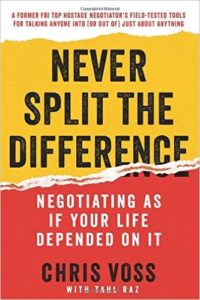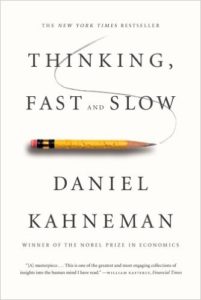FBI Hostage Negotiator Meets Academics
A value we bring to our clients is keeping abreast with, and sometimes adding to, the contributions that are being made to fields like selling and negotiation. A few months ago when ordering the “Revised and Updated” edition of Bargaining for Advantage (Shell, 2016) a recommended book popped up on Amazon: Never S plit the Difference: Negotiating as if your life depended on it (2016).
plit the Difference: Negotiating as if your life depended on it (2016).
Intrigued by the title, I dug a little deeper and eventually ordered, read and have incorporated some of the principles set forth in that book into our training. The author, Chris Voss, is a former hostage negotiator for the FBI and the title comes from his central point that, in negotiating for a hostage, you cannot compromise and split a human life.
One of the criticisms we hear from time-to-time, is that most of the material on negotiations comes from academics and not from people in the field actually doing negotiations. Well, in Voss we have the perspective of someone who rose to the top of his field negotiating with terrorists and bank robbers for human lives.
Voss reinforces what research shows and what we emphasize in our training: the best negotiators are those who know the most about the other party. For example, Voss writes:
“Questions always questions” (p. 166)
“It is not how well you speak, but how well you listen.” (p. 225)
“Listen, listen again and listen some more.” (p. 228)
While Never Split the Difference is a worthwhile read, it is not the only nor first  book I would recommend on negotiations. That would be Daniel Kahneman’s Thinking Fast and Slow (2011). Kahneman and his long-time partner Amos Tversky have likely conducted and published more research to help us understand human behavior than any other duo. Kahneman, a psychologist, won the 2002 Nobel Prize in economics after Tversky passed away. His friendship and collaboration with Tversky was the topic of the Undoing Project ( 2017) by Michael Lewis which we treated in the previous blog.
book I would recommend on negotiations. That would be Daniel Kahneman’s Thinking Fast and Slow (2011). Kahneman and his long-time partner Amos Tversky have likely conducted and published more research to help us understand human behavior than any other duo. Kahneman, a psychologist, won the 2002 Nobel Prize in economics after Tversky passed away. His friendship and collaboration with Tversky was the topic of the Undoing Project ( 2017) by Michael Lewis which we treated in the previous blog.
Indeed, much of what Voss advocates comes from Kahneman’s research showing the importance of emotions in the negotiation process. The FBI relied on Kahneman to shift their focus from a complete rational approach (ala Getting to Yes) to addressing the emotions involved in a kidnapping. As Voss colorfully observes, “Have you ever tried to devise a mutually beneficial win-win solution with a guy who thinks he is the messiah?” (p.14)
While many in business negotiations would characterize the other party as difficult or even unreasonable, not many would want to see him dragged away in a white suit. Okay, some of you would. But, the bottom line is that Kahneman and Tversky’s research demonstrates that most decisions are not fully rational. There is almost always an emotional component. The best negotiators address both the rational and emotional dimensions or what Kahneman refers to as System 1 and System 2.
In summary, Voss is a good read but Kahneman is the real deal upon which many of the FBI tactics Voss writes about are based.

Great read Arnie. I have Thinking Fast and Slow in my car (audio) and on my shelf (paper). You did a great job of summarizing a key element of the book.
Always good hearing from you. There is so much in Thinking Fast & Slow that it was a slow read for me. I kept stopping and thinking about implications. Combining audio and paper read is probably a good combination. – Arnie
Arnie, great article. Not sure if you are familiar with him but years ago, I had the opportunity to meet and attend a seminar by Herb Cohen, the author of “You Can Negotiate Anything”-nine months on the New York Times bestseller list. For almost 3 decades Mr. Cohen conducted negotiating programs for top-level executives and the N.E.I. at the F.B.I.’s behavioral science unit, Quantico, VA., where he was instrumental In helping develop the acclaimed “hostage negotiating program”.
“To help get our 52 hostages back from Iran, the Carter Administration called upon Herb Cohen, an internationally respected negotiator. He not only told Jimmy Carter’s people what they were doing wrong–while they were doing it–but predicted the release of the hostages almost to the exact hour.” “On the other hand, Ronald Reagan responded as Cohen recommended, and the Iranian’s reacted as Cohen predicted–on the exact deadline he had foreseen.” – Washington Post Syndicated Columnist Jack Anderson, Thursday, February 12, 1981.
Pat – Thanks for the comment. I remember the Iranian hostage crisis well but did not know about Cohen’s role in it- Arnie